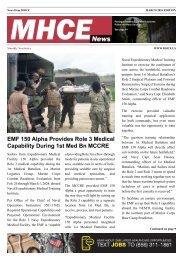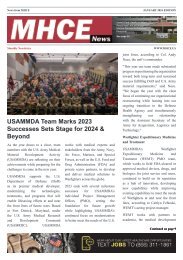December 2022 — MHCE Newsletter
Create successful ePaper yourself
Turn your PDF publications into a flip-book with our unique Google optimized e-Paper software.
WWW.<strong>MHCE</strong>.US Monthly <strong>Newsletter</strong> | 17<br />
Bill to Help Deported<br />
Veterans and Non-<br />
Citizen Troops Clears<br />
House<br />
Deported veterans would have an easier path to returning to the<br />
United States, and non-citizen service members would have<br />
earlier opportunities to apply for naturalization under a bill passed<br />
Tuesday by the House.<br />
The bill, called the Veteran Service Recognition Act, would also<br />
add more hurdles to deporting non-citizen veterans. It cleared the<br />
House in a largely party-line 220-208 vote.<br />
"What American would deny that we should treat non-citizen<br />
veterans with fairness and compassion," House Veterans Affairs<br />
Committee Chairman Mark Takano, D-Calif., the bill's sponsor,<br />
said on the House floor. "This is an opportunity to honor our brave<br />
veterans for their heroism regardless of the country they were born<br />
in."<br />
The bill still needs to pass the Senate in order to become law, an<br />
unlikely prospect with just a couple weeks left in this congressional<br />
session and Republicans holding enough seats in the upper chamber<br />
to block bills they oppose. In passing the bill Tuesday, House<br />
Democrats used the last days of their majority to send a message<br />
on an issue they've been pushing since the Trump administration.<br />
Non-citizens are eligible for expedited citizenship if they serve<br />
honorably in the U.S. military. But advocates charge that defense<br />
and immigration officials put up too many hurdles in the process<br />
and don't do enough to inform immigrant service members of their<br />
eligibility.<br />
Deportations of immigrant veterans garnered significant attention<br />
during the Trump administration, which took a hard-line approach<br />
to immigration in general.<br />
The Biden administration has sought to roll back some of its<br />
predecessor's policies, including issuing a directive in June saying<br />
Immigration and Customs Enforcement, or ICE, will consider U.S.<br />
military service when deciding whether to deport veterans.<br />
The Biden administration has also been reviewing deported<br />
veterans' requests for humanitarian parole to reenter the United<br />
States under a program launched last year called the Immigrant<br />
Military Members and Veterans Initiative, or IMMVI.<br />
But immigration advocates say the Biden administration has not<br />
moved decisively enough. As of June, just 16 veterans and family<br />
members had been allowed back into the country under a temporary<br />
status known as humanitarian parole through the IMMVI program.<br />
Advocacy groups have also accused the Pentagon of slow-walking<br />
immigrant service members' citizenship applications despite a 2020<br />
court order nullifying the Trump administration's more difficult<br />
application process.<br />
“Men and women who served honorably should not face barriers<br />
to citizenship or face deportation from the country they served or<br />
fought to defend,” the American Legion said in written testimony<br />
to the House earlier this year in support of the bill. “It is only right<br />
that we recognize their service with the pathways to citizenship<br />
they deserve.”<br />
Under the bill approved by the House, non-citizen service members<br />
would have to be afforded the opportunity to apply for naturalization<br />
as soon as their first day of service. The bill would also call on<br />
the Pentagon to have a Citizenship and Immigration Services<br />
employee or someone else trained in immigration law stationed<br />
at each military entrance processing station to ensure non-citizen<br />
recruits have information on naturalization opportunities.<br />
In addition, the bill would allow deported veterans to apply to<br />
become legal permanent residents of the United States if they have<br />
not been convicted of a serious crime.<br />
And it would create a "Military Family Immigration Advisory<br />
Committee" at the Department of Homeland Security to review<br />
cases of veterans and their family members facing deportation and<br />
make recommendations, based in part on their military record, on<br />
whether they should be allowed to stay in the country.<br />
A couple hundred veterans could be affected by the bill, Takano<br />
said.<br />
In a statement Tuesday, the White House said it supports the bill<br />
and "recognizes the need to improve our laws to better protect<br />
noncitizens who honorably serve in the Armed Forces."<br />
Republicans largely opposed the bill over what they have described<br />
as a Biden administration-fueled "crisis" at the U.S.-Mexico<br />
border. Republicans cite record numbers of Customs and Border<br />
Protection encounters with immigrants at the border and drug<br />
seizure numbers.<br />
The bill "creates additional carve outs to an already broken<br />
immigration system," Rep. Mike Bost, R-Ill., the ranking member<br />
and likely next chairman of the House Veterans Affairs Committee,<br />
said on the floor. "Right now, DHS can't even do their job of<br />
securing the southern border and enforcing immigration law."<br />
Republicans also argued that most deported veterans have<br />
committed other crimes and so are too dangerous to be in the<br />
country.<br />
Many deported veterans' convictions are drug-related, according<br />
to a 2019 Government Accountability Office report and some<br />
advocates argue that traumatic events in the military and a lack of<br />
access to resources afterward often contribute to those crimes.


















